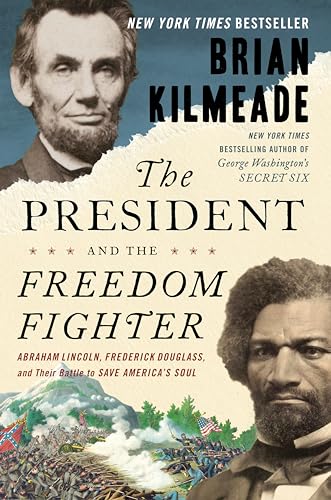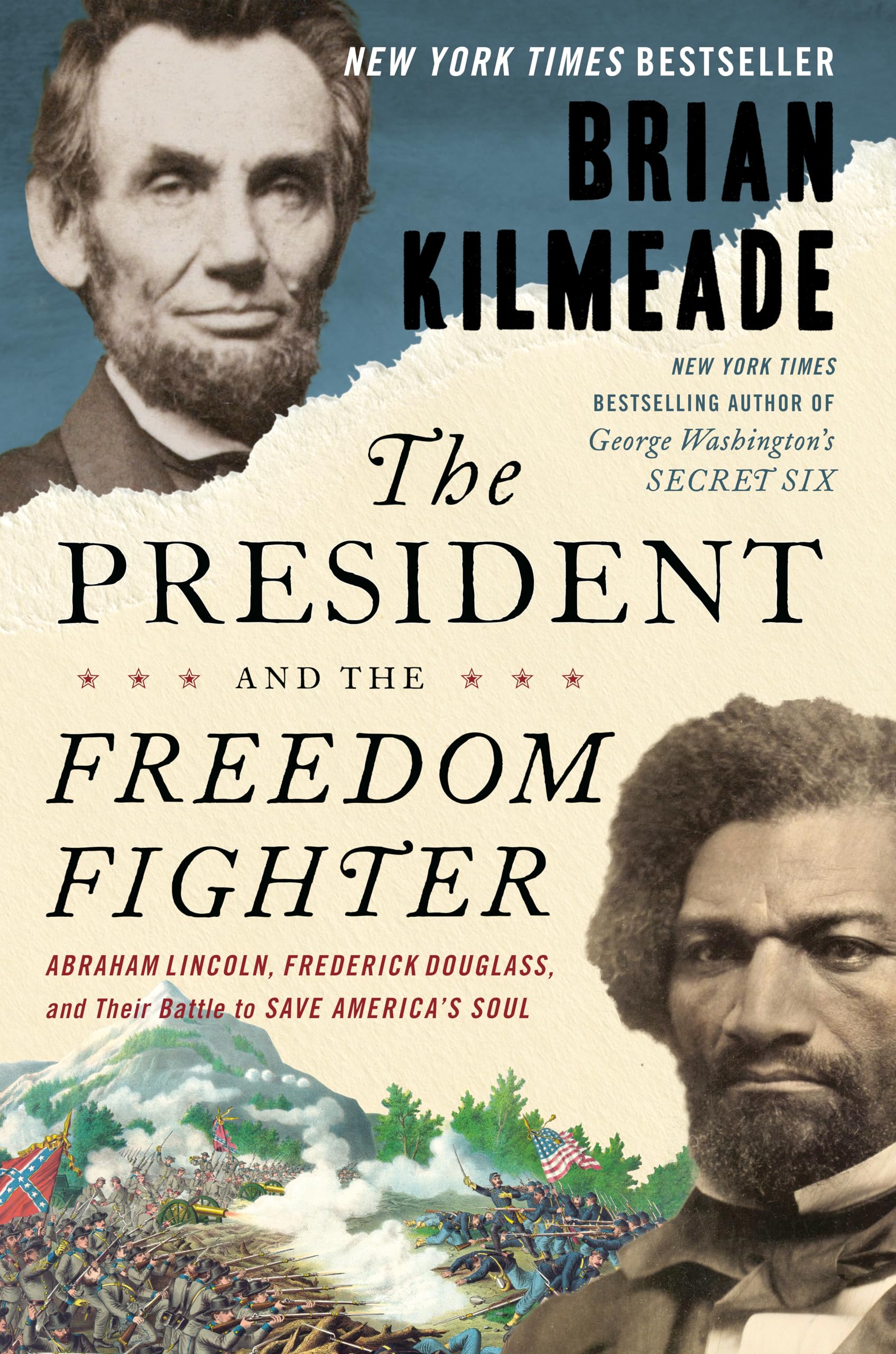Customer Services
Copyright © 2025 Desertcart Holdings Limited



The President and the Freedom Fighter: Abraham Lincoln, Frederick Douglass, and Their Battle to Save America's Soul [Kilmeade, Brian] on desertcart.com. *FREE* shipping on qualifying offers. The President and the Freedom Fighter: Abraham Lincoln, Frederick Douglass, and Their Battle to Save America's Soul Review: Vivid Dual Biography Leading to the Abolotion of Slavery - Brian Kilmeade's The President and the Freedom Fighter recounts the events leading to the abolition of slavery by intertwining the stories of the two leading figures in the movement. This is a factual analysis of events, no "moonlight and magnolias" history which glosses over the issue of slavery and its catastrophic effects on the nascent nation. Kilmeade's stated goal, "I wanted to tell a Civil War story that didn't further divide the nation while confronting the horrific era of slavery..." (257) is achieved in this engrossing volume. Furthermore, his technique of interweaving Douglas's and Lincoln's stories into a single narrative succeeds in covering a tremendous amount of ground while maintaining a brisk pace. While this book is entirely factual and contains footnotes and a bibliography, it is also a reader-friendly work of popular history. Kilmeade weaves the progression of each man from obscurity to greatness that is, while familiar to students of history, also fresh and "utterly captivating," owing to its crisp prose and intertwining technique. Kilmeade's narration and analysis of the lives of both men reads like a uniquely American "rags to riches"-esque tale. They appeared on the scene when needed the most; "they were underdogs who somehow rose to become national figures at a time of crisis, (they) would transcend their eras." Ultimately these two unlikely heroes saw America through its greatest crisis, and committed to the Constitution, helped America finally live up to its values. Kilmeade's histories have been lambasted by some critics, owing either to his day-job at Fox News, his alleged right-wing approach to his subjects, or both. However these miss the mark. This is popular, accessible history. I assess his intended audience doesn't have PhDs. Kilmeade provides the basic facts, and more importantly a fresh perspective for those new to but interested in these historical figures. Please allow me to quote from a KIRKUS review of Kilmeade: …"in this age of general historical ignorance, apathy, and slander, accessible history is better than internet rabbit holes and rampant disinformation." The general public in this sharply, dangerously divided time could do much worse than embrace this heroic story. Review: solid reading for knowledge and history of these two men - This is an easy read full of the history of both men, Abraham Lincoln and Fredrick Douglass. It is well documented and I enjoyed learning a lot of the inner workings of both men and those around them. Shaping a nation and policies are never an easy task but this does show that minds can be changed for the good and to strive for the Union of the people of this great Nation. Humility is a quality that was undeniably essential for these changes to take place. This book also shows that we as a people have not changed as much as we think we have. Current events show rebellion, mob mentality, voter fraud, disrupting events and even discrimination are still very prevalent and as humans we are at fault. People still cling to the ideas that they are good, but in reality this book shows even the best of us can make wrong decisions based on beliefs and education. We must look to the humility to learn and also the wisdom to understand we are all one race, The Human Race. We can be united if we allow others to take the lead if needed or be the one to speak up for those without a voice. Only one who puts the needs of others ahead of their own for no person gain is fit to lead and/or be a part of our leadership roles.
| Best Sellers Rank | #439,602 in Books ( See Top 100 in Books ) #74 in American Civil War Biographies (Books) #194 in US Presidents #270 in U.S. Civil War History |
| Customer Reviews | 4.8 4.8 out of 5 stars (5,204) |
| Dimensions | 6.22 x 0.99 x 9.26 inches |
| Edition | First Edition |
| ISBN-10 | 0525540571 |
| ISBN-13 | 978-0525540571 |
| Item Weight | 1.08 pounds |
| Language | English |
| Print length | 304 pages |
| Publication date | November 2, 2021 |
| Publisher | Sentinel |
C**S
Vivid Dual Biography Leading to the Abolotion of Slavery
Brian Kilmeade's The President and the Freedom Fighter recounts the events leading to the abolition of slavery by intertwining the stories of the two leading figures in the movement. This is a factual analysis of events, no "moonlight and magnolias" history which glosses over the issue of slavery and its catastrophic effects on the nascent nation. Kilmeade's stated goal, "I wanted to tell a Civil War story that didn't further divide the nation while confronting the horrific era of slavery..." (257) is achieved in this engrossing volume. Furthermore, his technique of interweaving Douglas's and Lincoln's stories into a single narrative succeeds in covering a tremendous amount of ground while maintaining a brisk pace. While this book is entirely factual and contains footnotes and a bibliography, it is also a reader-friendly work of popular history. Kilmeade weaves the progression of each man from obscurity to greatness that is, while familiar to students of history, also fresh and "utterly captivating," owing to its crisp prose and intertwining technique. Kilmeade's narration and analysis of the lives of both men reads like a uniquely American "rags to riches"-esque tale. They appeared on the scene when needed the most; "they were underdogs who somehow rose to become national figures at a time of crisis, (they) would transcend their eras." Ultimately these two unlikely heroes saw America through its greatest crisis, and committed to the Constitution, helped America finally live up to its values. Kilmeade's histories have been lambasted by some critics, owing either to his day-job at Fox News, his alleged right-wing approach to his subjects, or both. However these miss the mark. This is popular, accessible history. I assess his intended audience doesn't have PhDs. Kilmeade provides the basic facts, and more importantly a fresh perspective for those new to but interested in these historical figures. Please allow me to quote from a KIRKUS review of Kilmeade: …"in this age of general historical ignorance, apathy, and slander, accessible history is better than internet rabbit holes and rampant disinformation." The general public in this sharply, dangerously divided time could do much worse than embrace this heroic story.
A**T
solid reading for knowledge and history of these two men
This is an easy read full of the history of both men, Abraham Lincoln and Fredrick Douglass. It is well documented and I enjoyed learning a lot of the inner workings of both men and those around them. Shaping a nation and policies are never an easy task but this does show that minds can be changed for the good and to strive for the Union of the people of this great Nation. Humility is a quality that was undeniably essential for these changes to take place. This book also shows that we as a people have not changed as much as we think we have. Current events show rebellion, mob mentality, voter fraud, disrupting events and even discrimination are still very prevalent and as humans we are at fault. People still cling to the ideas that they are good, but in reality this book shows even the best of us can make wrong decisions based on beliefs and education. We must look to the humility to learn and also the wisdom to understand we are all one race, The Human Race. We can be united if we allow others to take the lead if needed or be the one to speak up for those without a voice. Only one who puts the needs of others ahead of their own for no person gain is fit to lead and/or be a part of our leadership roles.
C**R
History
Great book
D**L
Riveting And Revealing History and Personal Stories of Two Giants in American History
This is an outstanding book! Articulate, descriptive, and charts the parallel paths of Lincoln and Douglass and their collaboration to defeat the Confederacy and save the nation. Kilmeade presents the interesting and historical backgrounds of both men, towering giants in the pantheon of great and consequential Americans whose combined efforts brought an end to slavery. Many compelling and unknown facts about Frederick Douglass are brought to light, revealing him to be a man of astounding courage and character, as well as a gifted writer with a keen intellect and irrepressible fighter for justice. His face belongs on Mount Rushmore or, at least, on our money. It's a riveting read that teaches volumes about this epic, essential chapter of American history and pays tribute to the brave commitments of Lincoln and Douglass to expose themselves to danger in service of a greater cause. Stirling examples of the best aspects of human nature.
C**N
Good Book that Covers the Waterfront on Lincoln and Douglass
This book pretty well told a great story of each man as well as their relationship. I learned a lot...some of which I don't think I had ever been taught. I found the writing style to be odd....often lacking basic punctuation. This caused me to have to reread many sentences. Probably just me but it was tricky. Also, the book could have used a better proof reader. A lot of errors. In the end it didn't put me off enough to not finish the book. I would recommend the read but just be patient.
A**6
Couldn't put it down! The absolute best writing of either Lincoln or Douglass I've ever read!
I was so intrigued by the title that I bought this wonderful history of these two great, evolving leaders of our nation's history told in a way that not only left me anxious to read the 'next' chapter but in a way that illuminated history that I thought I knew, unfolding nuances and hidden purposes of these two great thinkers and political movers. I've read nearly the entire Bruce Catton series on the Civil War, all of Fredrick Douglass' autobiographies, and several Lincoln histories, too, not to mention the many videos by recognized historian documentarians. This little book makes them all come together in a way that makes one dare to think that we have so much we must do, we are still able to do to bring their shared dream of equality and humanity into that great whole righteousness of Christianity and brotherhood, of love for one another, as friends able to share and discuss pathways, even with our differences, to achieve these supremely honorable common goals.
A**R
I got as a Christmas gift for my son.
I**T
Seems maybe an agenda was being done with the book?Not Kilmeade's best work in this series. Hope for improvement in the next one.
N**E
Lincoln and the the others democrats did not want to have the free slaves to stay in America, he planned to deport them to central America or Liberia or Haiti. The Civil War was not about the freedom of slaves but about the fight against the Southern states which did not want free trade with Britain. Abolition of slavery was a policy to destroy the economy of the Southern states. This book quotes the speeches of Lincoln and other democrats leaders and put the truth first
R**H
Brian Kilmeade is a great writer.
Trustpilot
5 days ago
3 weeks ago